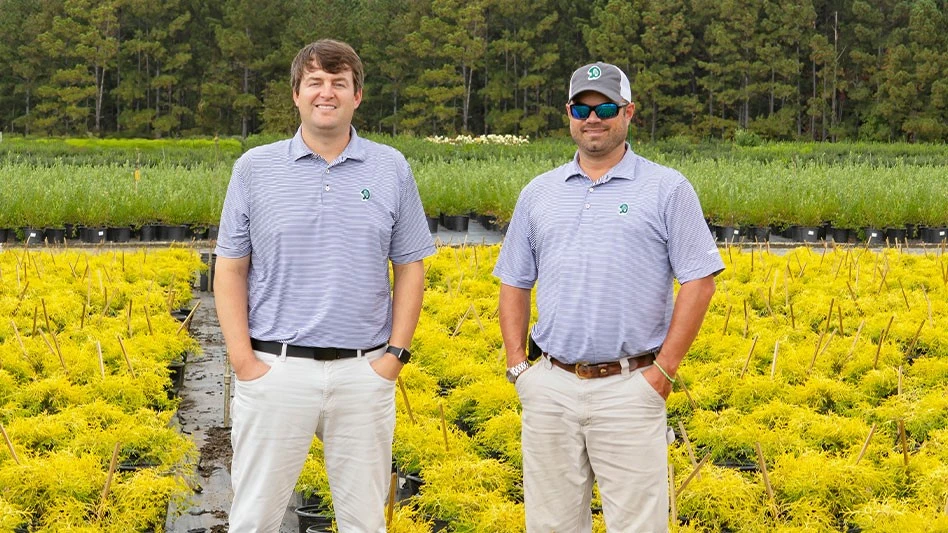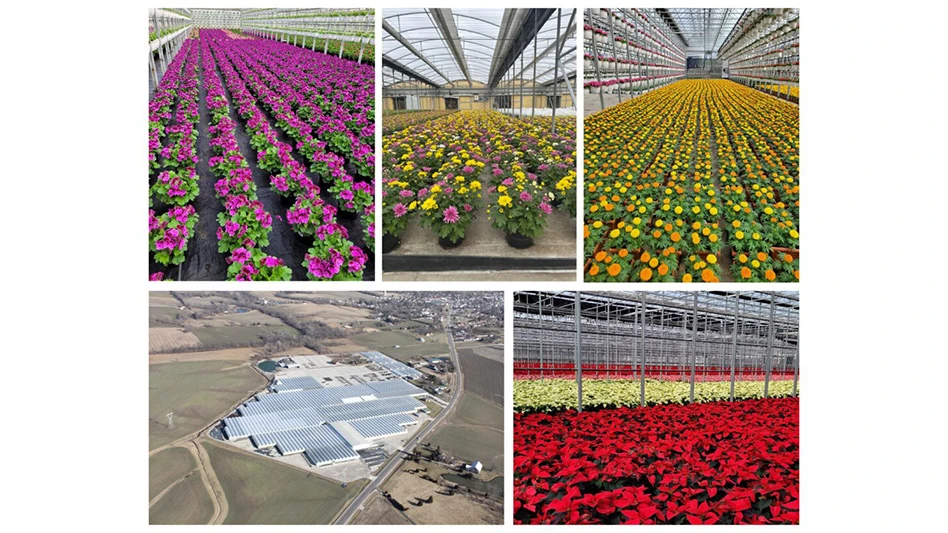

For many family-owned nurseries, turning the reins over to the next generation often gets delayed. But at R.A. Dudley Nurseries, Inc. in Thomson, Georgia, that wasn’t the case. With a vote of confidence from their fathers, cousins Bennett and Al Dudley took over the nursery’s management in January 2020 — a full year earlier than planned. These fifth-generation Dudleys are adding their chapter to the family legacy. And their hopes are set high.
Learning from previous generations
The roots of R.A. Dudley Nurseries reach back to the 1940s when Bennett and Al Dudley’s great-great-granddad started a landscaping business that grew its own plants. In those years, the growing operation only supplied Dudley Landscaping, keeping the plant material it grew for its own. The business advanced in 1948 when the next generation officially founded R.A. Dudley Nurseries, Inc.
For the next 30 years, the nursery focused on field-grown, hand-dug B&B trees and shrubs. But then brothers Tommy and Mike Dudley — fathers to Al and Bennett, respectively — came back from college in the 1970s. In a major shift, the brothers turned the business into an above-ground container operation in 1978.
By 2015, R.A. Dudley Nurseries had grown from a small operation of 12 employees and 65 acres to 115 employees and 175 acres of irrigated bed space on more than 700 acres of Georgia land.
Bennett Dudley had already returned to the business in 2007, after college and other industry experience. He was working under his father, Mike, in sales. When Al followed a similar path and came back in 2015, the cousins made a change.
Al moved into the sales position, working with his uncle Mike. Bennett started working production with Al’s father, Tommy. “We kind of crossed responsibilities in the change of generations,” Al says.
It turned out to be a good decision, one Bennett and Al say holds a powerful lesson for family-run businesses. “In hindsight, me working with Tommy, and Al working with daddy was game-changing,” Bennett shares.
While the respect both men have for their fathers is unmistakable, so is their respect for the uncles who prepared them to lead the nursery. Bennett and Al explain — with some hearty laughter — that sons and fathers sometimes bump heads a bit, despite respect. But nephews tend to hold their tongues with uncles. And that can make the lessons you need to learn go faster and easier.
Accelerating succession plans
Tommy and Mike Dudley knew succession planning was important for the nursery’s future. A consultant helped guide the planning process. “He didn’t tell them when they had to leave, but he told them that they needed to give us a date of when they were going to leave,” Bennett recalls. Tommy and Mike set their retirement date for December 2020.
The brothers had done an exceptional job building R.A. Dudley Nurseries up from when they took over the business four decades earlier. They’d also done well developing the next generation to lead.
To Bennett and Al’s surprise, their fathers announced a change in their departure date. “After spring of ’19, they told us they were ready to step out of the way, and they were going to leave at the end of that year,” Al says.
It was a good feeling for the new leaders. “Both Al and I felt really confident when they left because we had been working for a while at the nursery and we had a good grasp of it,” Bennett says. “But I think they also felt they were holding us back a little bit. We were ready to try some new things and hopefully take the nursery to another level, and they knew that.”
Changes were already underway. The nursery enrolled in the H-2A program in 2019, alleviating a serious labor shortage. “We started slow with 14 guys, and we’ve moved up to 61 now,” Bennett says. Irrigated bed space increased to 205 acres. The nursery also moved heavily into branded plants, which now make up more than 40% of Dudley’s production.



When Tommy and Mike left, the entire 205 acres was packed with plant material. “They gave us a full nursery — like a full deck of cards— to play with when they left,” Bennett says.
The new leaders set a goal to keep the existing acreage full, maintain Dudley quality and turn plants faster and more efficiently than ever. Then those plans were put to the test.
Managing the global pandemic
The pressure was on. March and April 2020 were the nursery’s worst months in years. Bennett remembers, “We just looked at each other like, ‘Oh, great. This is a sixty-year business … Three months after we take over, we’re going to close.’”
Communication was key to overcoming the challenge. With Bennett as production manager and Al managing sales and shipping, the pair share all nursery management decisions 50-50. They rely on close teamwork and near-constant communication.
“We communicate all day, every day,” Bennett says. “Al and I have learned that the more you communicate to get the job done, the more efficient and better the business will be.”
With canceled orders and unknowns piling up, a tough decision surfaced: Keep the nursery full or back off production. Bennett and Al opted for full.
“That ended up being one of the best decisions we made for 2021 and 2022. Because when you grow a plant, it doesn’t turn in five months. It turns in a year or two,” Bennett says. When the 2021 plant shortage hit, Dudley’s had stock to sell.
Al remembers a Nursery Management magazine cover emblazoned with ‘SOLD OUT’ that spring. “At that time, we were sitting very good on inventory,” he says. Calls started pouring in from people needing plants. Dudley customers came first, but new customers grew.
2022 held more challenges. Dudley’s had sufficient bark and fertilizer stockpiles to last the year. But come spring, they hadn’t seen a pot shipment for five months. “We were down to our last couple of thousand old pots,” Bennett says.
Then Al’s team got busy making calls, and he started routing Dudley trucks to their customers’ customers, picking up empty pots. They weren’t always the right size — or the right color and logo — but brand partners agreed with their strategy: Keep potting and get ‘em on the ground.
That meant a lot of pot-swapping later in the season, but R.A. Dudley has inventory for another record year in 2023.
Focusing on efficiencies
As Bennett and Al advance, they concentrate on optimizing efficiencies to strengthen what their fathers built. They’ve slimmed SKUs down from nearly 1,700 to 1,300. They’re potting more plants than ever, but they’re focused on what sells and what they grow best.
They’ve gone deeper on deciduous plants, which grow faster and turn quicker than broadleaf material and evergreens. Slower-growing, less successful varieties got cut first. “Our rule when we first took over was: If we can’t sell 1,000 of it, we don’t need to grow it,” Bennett shares.
The rewholesale market is their primary customer base, followed by independent garden centers. Big-box stores aren’t in the mix. “We’re happy with our current customer base. They’ve taken care of us and hopefully, we’re doing a good job taking care of them as well,” Al says.
Container production focuses on 1-gallon, 3-gallon and 7-gallon pots. The pair estimates 7-gallon production increased at least 50% in the last five years. The goal is to never let their top 50 sellers leave the availability. They’re hoping to increase that to their top 200.
The nursery grows some 15-gallon varieties, but don’t expect to produce more. Dudley ships mostly on carts, and 15-gallon pots mess with efficiency. “That one would not be the growing, it would be the loading dock efficiencies,” Al explains.
Geography makes Atlanta, Charlotte and Nashville the nursery’s biggest markets. But Dudley trucks and trailers run from Florida to Philadelphia, west to Memphis and St. Louis.
As this story goes to press, the nursery is finishing a 72,000-square-foot loading dock project that quadrupled the existing 1996 dock. It’s another investment to get trucks and plants out the door more efficiently.
2022 is on track to be R.A. Dudley’s best year yet, joining 2020 and 2021 as record years. Al acknowledges the pandemic boost but also credits their work: “It was a perfect storm brewing when we took over, but I do think our efficiencies helped us get it out the door and fulfill those orders quicker than we ever have before.”
Looking to the future
Bennett and Al are humbled by the “golden opportunity” their fathers gave them. “The previous generation did a lot of great things. They set us up for success,” Al says. They’re proud of the office staff that helps them succeed, calling them one of the industry’s best. Now it’s their turn to take the nursery into a new age.
Al explains that he and Bennett hope to make monumental changes like their fathers did: “The changes they made from the ‘70s to the 2000s, we’d love to make from now until we retire.” But with Al at 35 years old and Bennett at 40, that’s no time soon.
Besides Al’s brother and sister, who aren’t in the business, he and Bennett comprise the fifth generation. For the future, they look beyond siblings to the children coming up at their sides.
While the future looks strong, R.A. Dudley’s sixth generation looks decidedly different. Bennett and Al each have two children — all daughters. Bennett’s nine-year-old, the oldest, is already up for the task. “On her first day of school the last two years, she put that she wanted to do daddy’s job. I hope she’ll keep saying that,” he says.
One day, Dudley’s sixth generation may have their own golden opportunity. But it stands to be very different from what it is now. “We’re optimistic about the future. We don’t want to just ride with it. We want to keep going,” Al says.

Explore the November 2022 Issue
Check out more from this issue and find your next story to read.
Latest from Nursery Management
- Terra Nova Nurseries introduces rust-free and disease-resistant heucherella
- John T. Nickel, founder of Greenleaf Nursery Co., passes away at 89
- Three tours offered at 2025 Farwest Show
- Garden Media Group announces sixth annual Women in Horticulture Week
- Star Roses and Plants announces National Knock Out Rose Day
- The Growth Industry Episode 4: How federal budget cuts are affecting horticulture nonprofits
- Pennsylvania Horticultural Society shares top gardening trends from 2025 Philadelphia Flower Show
- California Spring Trials 2026 dates announced





